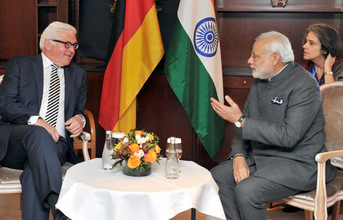
A gift for the German Chancellor
Prime Minister Narendra Modi gifted the German Chancellor Angela Merkel reproductions of some manuscripts and papers by Sir C V Raman who received the Nobel Prize in physics in 1930 for his work on scattering of light and whose life journey, even though he performed most of his studies and experiments in India, had a strong connection with Germany.
A major inspiration for Raman to pursue science as a career was the famous 19th century German physicist Hermann von Helmholtz. In a speech, he once compared von Helmholtz to Isaac Newton. Helmholtz's famous book The Sensations of Tone motivated Raman to undertake a scientific study of acoustics of both Indian and western musical instruments.
Two of the scientists who nominated him for the Nobel Prize were the German physician Richard Pfeiffer and the German physicist Johannes Stark who had won the Nobel in 1919. The terms Raman Effect and Raman Spectrum themselves were coined in 1928 by a German physics professor at Berlin University, Dr Peter Pringsheim.
Emerge leaders, calls PM
At the Community Reception in Berlin, Modi today said the time is right for India to emerge as a global manufacturing hub and that young professionals in Germany should act as a bridge between India and Germany, especially since Germany was a world leader in manufacturing.
He further said India needs the right environment for young talent to prosper and events like the Hannover Fair are opportunities for India to both showcase its capabilities and to learn from the work others were doing. India must aim to become a "zero-defect, zero effect" low-cost manufacturing hub, he emphasised.
End


























